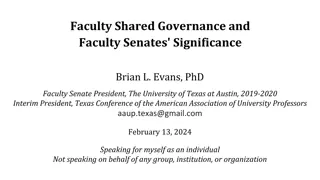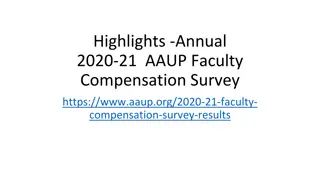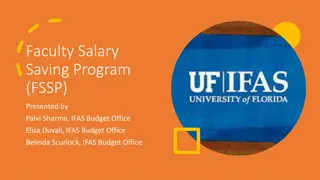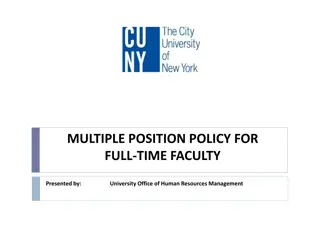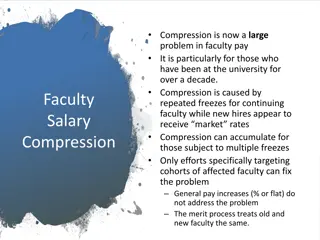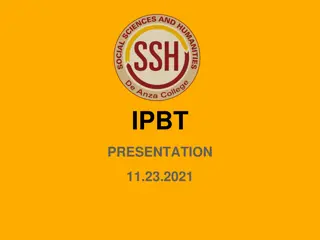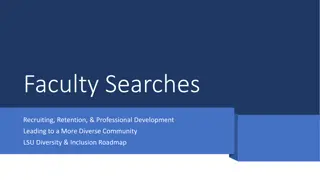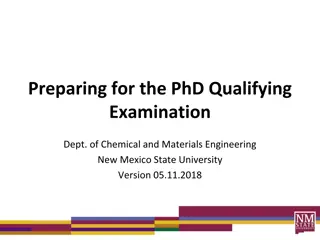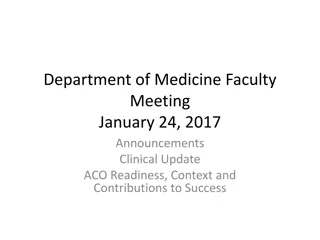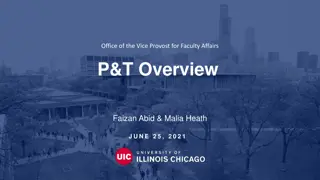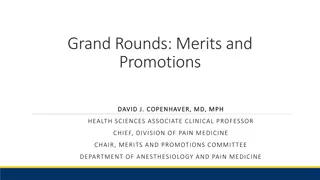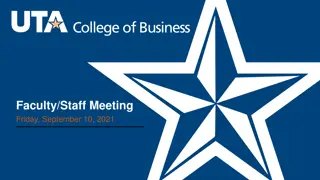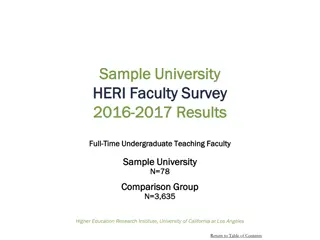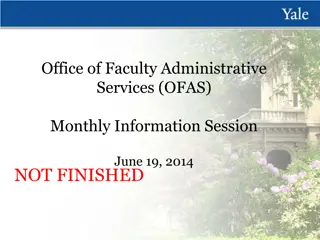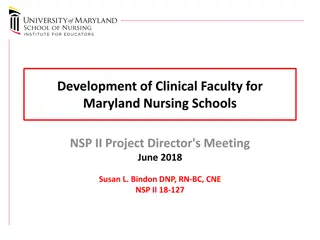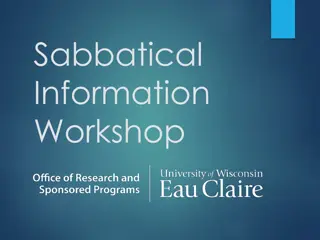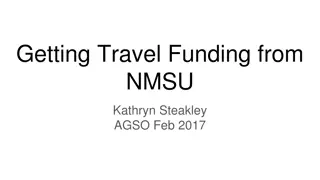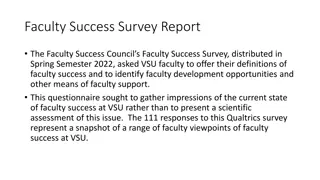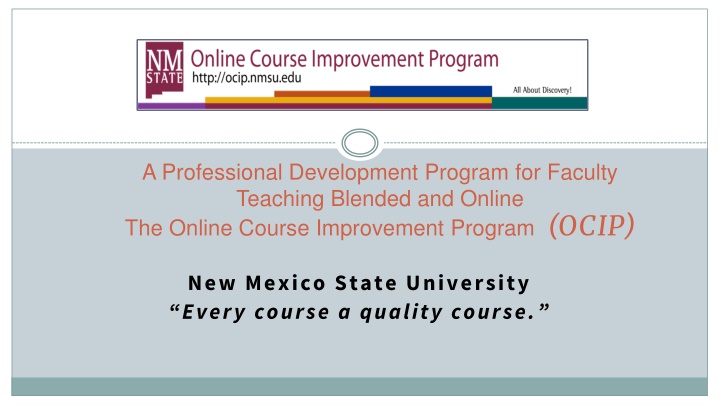
Innovative Faculty Development Program in Blended and Online Teaching
"Discover the comprehensive Online Course Improvement Program (OCIP) at New Mexico State University, designed to enhance faculty skills in online course design and delivery. Explore the program's goals, partnership background, role of Quality Matters, and blended approach featuring various methodologies for professional development. Benefit from a range of services and resources, promoting quality online education beyond campus boundaries."
Download Presentation

Please find below an Image/Link to download the presentation.
The content on the website is provided AS IS for your information and personal use only. It may not be sold, licensed, or shared on other websites without obtaining consent from the author. If you encounter any issues during the download, it is possible that the publisher has removed the file from their server.
You are allowed to download the files provided on this website for personal or commercial use, subject to the condition that they are used lawfully. All files are the property of their respective owners.
The content on the website is provided AS IS for your information and personal use only. It may not be sold, licensed, or shared on other websites without obtaining consent from the author.
E N D
Presentation Transcript
A Professional Development Program for Faculty Teaching Blended and Online The Online Course Improvement Program (OCIP) New Mexico State University Every course a quality course.
Program Background Partnership with Associated Students of New Mexico State University and College of Extended Learning. OCIP began Fall 2009 Program launch January 2010 Started with 11 One Year Plus Fellows (1-Y+) Feb - June 2010 hosted 15 PD events
Program Goals 1. Assist faculty in enhanced web course design and delivery while reducing student's textbook cost. 2. Provide faculty instructional design services with a framework that supports peer interaction and best practices for online learning. 3. Facilitate participation in national digital content consortiums and relevant communities. 4. Create and support a culture of quality for online courses taught at NMSU. 5. Develop a scalable, customized professional development model.
Role of Quality Matters Quality Matters (QM) is the theoretical and organizational framework for the program. Employs QM's continuous improvement approach. Professional development online course and monthly PD activities are thematically organized around the QM Rubric Standards
Professional Development Sept Oct Nov Dec Jan Feb Mar Apr QM1 QM2 QM3 QM4 QM5 QM6 QM7 QM8 PD follows a predictable learning cycle. QM thematic alignment of PD events- LTOT, workshop and/or webinar aligned to the 1Y+ PD course as much as possible
Blended Approach Using the best delivery methodologies available to meet the learning objectives for the professional development curriculum. Combination of synchronous, asynchronous, face-to-face, online, and hybrid offerings Adobe Connect Skype PBworks(wiki) Google Docs Program website Mentoring LMS Canvas
Multiple Benefits Supports a variety of services and resources available in different formats. Allows for delivery of services beyond main campus faculty that includes community college campus and non-NMSU participants. Increased faculty engagement due to flexibility of access Participants can receive professional development credit Recorded webinar archives and resources are also posted online for anytime viewing.
Services Program services available to a global audience include: OCIP Resource Center (http://bit.ly/pQM0ZO) OCIP webinars Some program services are only available to NMSU faculty: Formal and informal course reviews with QM Rubric Let's Talk Online Teaching (LTOT) sessions Open Labs Workshops and Presentations
One Year Plus Fellowship 36-hour online PD course 12 hours self-selected PD Revise online course to pass a QM Review Collect student evaluation data on the course design Give back to larger community Mentoring from Instructional Consultant Peer support $2000 stipend 50 PD hours toward Promotion & Tenure Certificate of Completion Student technology fees paid only by Las Cruces campus students help fund the programs, therefore only LC campus faculty can receive stipend.
Cohorts Applications Received Applicants Accepted Completions Cohort 1 Year 2009-2010 (Began January) 17 15 8 83% Completion Rate for 1Yr+ Fellowship Cohort 2 Year 2010-2011 19 15 12 Cohort 3 Year 2011-2012 20 15 12 Cohort 4 Year 2012-2013 30 22 18 Cohort 5 Year 2013-2014 27 14 11 Cohort 6 Year 2014-2015 24 15 14 Cohort 7 Year 2014-2015 18 12 TBA
OCIP Self Evaluation of Participation 100% 100% 100% 100 83% 83% 80 60 40 20 0 Met Learning Outcomes Engaged in Program PD was Challenging Relevance of Content Application of Content
QM1- Getting Started A start here is so simple and helpful for students. (Y3) QM1 changed my life. 150 students and only one question about where to find something. (Y5)
QM and Organization I think my class is so much better organized; it s easier to navigate for the students. They know what to do from the very beginning. (Y2) The OCIP Fellowship forced me to reexamine the way I structure online, not with respect to technology, but rather with access to and organization of content and the various ways to foster student interaction and engagement. (Y4)
QM2 Learning Objectives Objectives started me getting to think about my past evaluations. I used to think the student did not try hard enough. I now know it might be me. (Y3) For both my face to face class and online, I think the biggest impact has been really paying attention to the learning objectives then, aligning the activities and the assessments which I had not done at all before. (Y6)
QM and Alignment In addition, my face-to-face classes are now benefiting from my new understanding of course organization and alignment. (Y1) I now ensure my activities are aligned to my learning objectives. I know now, thanks to OCIP, how important it is to provide students the guidance on what they were learning and why they were learning it through clearly stated objectives and course goals. (Y4)
Transfer to Face face Courses The OCIP course changed how I teach both online and face-to-face .Having the model of quality courses really helped me work through the steps and make meaningful changes to my courses. All online and hybrid courses that I teach and coordinate are influenced OCIP. (Y1 & Y2) I don't have any true 100% face to face anymore. There are things in my face-to- face classes that I realized are better done online as a result of the things that I learned in OCIP. (Y1) I feel more confident in my face-to-face teaching techniques due to what I have learned in OCIP. (Y4)
Faculty Student Perspective Being in the student role was eye-opening and strength of program. (Y1) I m clearly thinking more about course design from the students point of view . (Y4) I got a much stronger sense of students needs from an online course . (Y4) ...one thing that I m doing more is taking the perspective of the student and thinking about my course design from their perspective and how I need to organize and spell things out and make things super clear. (Y5)
What Students Are Saying The layout of this class is wonderful. This class is the best online course I have ever taken. I liked the interaction between my peers and the availability of course material.
What We Have Learned Learning from student perspective Using Quality Matters framework Positive ripple effect Peer/Mentor support Culture of quality is a process
Then and Now: Growing OCIP Expanded program offerings with the New2Online Program and Course Development Summer Institute. Partnering with the College of Business and Master of Social Work cohort focusing on online degree programs.
Then and Now: Growing OCIP Annual IIQ Celebration QM System-wide Subscription and Group Peer Reviewer Group Looking to address PD for Online Teaching Insuring Quality - Provost s Focus Expanding Online Degree Programs
QUESTIONS?? Thank you for attending!

